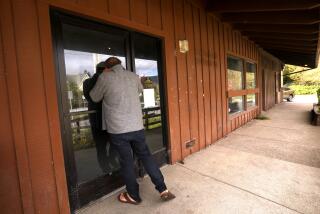Family Revives Postal Pioneer’s 150-Year-Old Back-Pay Claim
- Share via
RENO, Nev. — Long before ZIP codes and Express Mail, there was George Chorpenning Jr.
As the first man to carry mail across the barren Nevada desert, he fought loneliness and the elements, dodged Indian arrows and once ate dog meat to stay alive.
He survived, but along the way he lost his partner, 15 employees, about 300 mules and horses, and untold property to Indians.
Then his real problems began.
The pioneer mail contractor spent the rest of his life fighting Congress for compensation in what historians call one of the longest and most bitter claims ever filed by an individual against the U.S. government.
His claim prompted the attention of Presidents James Buchanan and Andrew Johnson, and made it all the way to the U.S. Supreme Court. He lost before dying a pauper in 1894 in New York at age 73.
One hundred and fifty years after he launched the first mail service between Sacramento and Salt Lake City along a route paralleling modern Interstate 80 across Nevada, his angry descendants are pressing Congress to reopen the “Jackass Mail” case.
They say the Somerset, Pa., native was never paid for extra services rendered and damages suffered when his contract for mule-driven delivery was canceled after running from 1851 to 1860.
“He was cheated by the government. There’s no question about it,” said Roe Johnson of Neversink, N.Y., a great-grandson. “It was totally unfair and uncalled for. I would like justice.”
Descendants are still bitter over an 1871 vote by Congress that effectively stripped Chorpenning of the postmaster general’s $443,010 award--worth $2.7 million in today’s dollars.
They insist payment was stopped at the last minute because of a conspiracy by a group of men who leveled charges of fraud against Chorpenning after failing to extort $50,000 from him. No criminal charges resulted.
Descendants say Congress failed to appreciate his efforts in establishing regular monthly service on one of the untamed country’s most challenging 19th century mail routes.
Traversing California’s Sierra and the wastes of Nevada and Utah, the 900-mile route featured just one major supply station: in Genoa, 60 miles south of Reno.
Historians acknowledge Chorpenning’s contribution to transcontinental communication, saying he blazed a trail for the Pony Express at a time when most mail to and from California was still being shipped via Panama.
They note similar postal claims against the government were common in the 1800s, with some approved by Congress and others rejected.
When Johnson tried to get his congressman to reopen the case in 1998, he revived a battle that either Chorpenning or his descendants have been fighting off and on for a century and a half.
Like the others, he failed.
“Regrettably, at this time I believe that it would be a futile effort to try and bring this matter before Congress,” wrote Rep. Maurice D. Hinchey (D-N.Y.). “As a general rule, Congress is not very eager to open old cases that have already received appropriate attention.”
But like the strong-willed Chorpenning, descendants refuse to give up.
Brent Chorpenning and his wife, Jeanette, of Raleigh, N.C., plan to take up the Jackass Mail operator’s cause. Justice, not money, is the issue, they say.
“He got the raw end of the deal, that’s all I can say,” said Brent Chorpenning, 51, a great-great-grandson. “If other people had ancestors who were as wrongly treated, they would pursue it too.”
Historians are split over the validity of the claim. Some say he was entitled to the $443,010, while others say two earlier, smaller government awards were adequate compensation.
“I did an exhaustive study of his claim and concluded it was fraudulent and grossly inflated,” said postal historian Daniel Metscher of Albuquerque. “I would think the descendants have no chance of reopening the case.”
But postal historian Doris R. Bradley said hundreds of documents in the case attest to the hardships and financial losses suffered by Chorpenning.
“He pleaded for an open hearing [in the 1880s] where he would be allowed to answer his accusers,” she wrote. “He died . . . still the victim of baseless and cruel slander, and no one had heard him.”
Nancy Pope of the Smithsonian Institution’s National Postal Museum in Washington, D.C., said family members should instead buy a headstone for Chorpenning, who’s buried in an unmarked grave in Brooklyn, N.Y.
“I’m fascinated by how you can keep something like this running from one generation to another,” she said. “But I think they [descendants] are unrealistic.”
Chorpenning’s descendants say the tombstone is a top priority, but they’ll press on with the fight.
“Look at all the Indian claim settlements,” said great-grandson Frank Chorpenning, 87, of Delaware, Ohio. “I think George would be sympathetic with anyone who pursues this.
“Just because it hasn’t succeeded so far doesn’t mean it’s a lost cause.”
More to Read
Sign up for Essential California
The most important California stories and recommendations in your inbox every morning.
You may occasionally receive promotional content from the Los Angeles Times.










